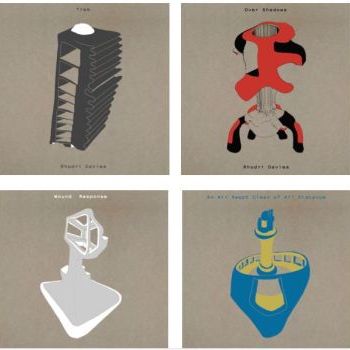Rhodri Davies is not a unique artist and musician, but he’s pretty close. Just like Okkyung Lee with the cello and John Butcher on the saxophone, Welsh harpist Davies totally deconstructs, reimagines and explores his instrument, at times to the point of making it utterly unrecognisable. At times on 2012’s Wound Response, the results were astounding, the harp practically transformed into a vicious noise generator, which Davies then manipulated in ferocious ways, creating one of the most explosively beautiful albums of that year.
Wound Response features in this new box set on alt.vinyl, along with two other previous works as well as his latest, An Air Swept Clean Of All Distance. While there are some similarities between these albums (with the exception of the one-track drone masterpiece ‘Over Shadows’, and even that bears the same formal curiosity and rigour that has long characterised Davies’ work), each one stands as a unique work of art in its own right, with rich details and colourations. The tools are often the same, mind you: harps of varying sizes are manipulated using fans, EBows and other implements, either extending or reducing notes into blocks of sound and texture that appear to rip the instrument’s rulebook up altogether. After all, the harp is perhaps more linked to past musics than any other instrument bar the harpsichord, so to hear it so transformed is both a thrill and a challenge. The term often used for Rhodri Davies’ music is "reductionism", but the term seems unfitting when the results are so captivating.
Wound Response is, as I’ve written, pretty brutal, a series of crunching robust vignettes that are almost punk-like in their muscularity. Davies’ small harp sounds almost like a guitar, and it’s little surprise that he previously played with Derek Bailey. This is not mere noise, however, and the Welshman is a virtuoso musician, with each track following a dynamic path, as Davies plucks away furiously at the strings, tumbling from one motif to another with balletic dexterity. In doing so, he actually goes against the conventions of what harpists are taught, going so far as to attack the strings with a plectrum. I can see where the term reductionism came from given the probable repercussions of this method (harp’s aren’t exactly robust), but again, it doesn’t sit well given the heights Davies reaches. Trem (from 2001) follows a similar pattern, although it’s shorter and denser, with Davies using free jazz and free improv techniques (crocodile clips on the strings, holding a tamborim against a string whilst bowing close to the soundboard, depressing all seven pedals at once) in front of an audience who must have been as bewildered as they were thrilled. Once again, the harp’s sound is completely transformed, oscillating between clusters of feedback and parping notes that sound like a cross between a trumpet and a piano. Although in a way more minimalist and eclectic than Wound Response, Trem is equally potent and abrasive and a good insight into what a Rhodri Davies concert could perhaps be like.
In contrast, Over Shadows is almost delicate. Although Derek Bailey apparently wasn’t much impressed with Davies’ use of EBows, the latter persisted and the single 30-minute piece that constitutes Over Shadows is in its way as stirring as Wound Response or Trem. Eliane Radigue has previously composed especially for Davies, and there’s something of her patient, unflappable style on Over Shadows, as slow, hesitant drones slide in and out of perception like sluggish waves on a lakeside beach. Davies toys with varied tunings, almost in the "militant tuning" ethos of a LaMonte Young, Pauline Oliveros or Tony Conrad (only quieter than the latter) and the piece gradually builds up into a resonant sonic edifice in which details shimmer and surreptitiously shift like light playing across a window.
The same lap harp as on Wound Response is used again on An Air Swept Clean Of All Distance, but the results could not be more disparate. Eschewing amplification and limiting the number of strings used, Davies accentuates the instrument’s versatility and improvisational possibilities as he relies on his thumbs and fingers to extract texture and rhythm from the harp. An Air Swept Clean Of All Distance vaguely recalls Bill Orcutt’s recent solo acoustic guitar output, but also harks back in no small fashion to the traditional music of Davies’ native Wales, as if he’s reimagining folk for the improvisational age. On each of these albums, Rhodri Davies achieves marvels by almost counter-intuitively imposing rigid parameters on his music, from the tools he uses to the way the albums are recorded. In each case, he finds fresh ways to interact with his harp and fresh ways to jerk his listeners’ preconceptions. That, for me, is the mark of all truly great music and musicians, and Rhodri Davies is certainly one of the latter.
<div class="fb-comments" data-href="http://thequietus.com/articles/16430-rhodri-davies-pedwar-review” data-width="550">


